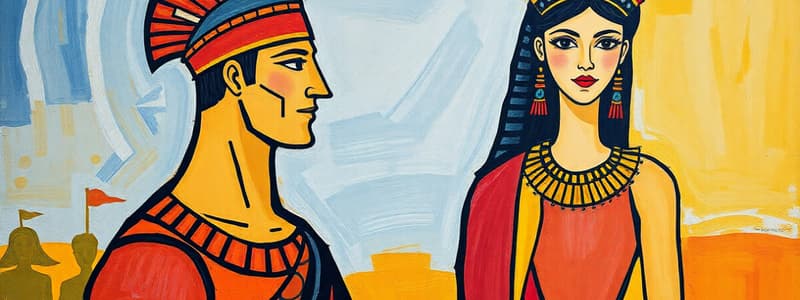Podcast
Questions and Answers
What was the name of the period of peace and prosperity that Rome experienced under Augustus and other emperors?
What was the name of the period of peace and prosperity that Rome experienced under Augustus and other emperors?
- Golden Age
- Roman Republic
- Roman Empire
- Pax Romana (correct)
Which of these structures was NOT built by the Romans?
Which of these structures was NOT built by the Romans?
- Trajan's Column
- The Taj Mahal (correct)
- The Colosseum
- The Pantheon
What was the main difference between patricians and plebeians in the Roman Republic?
What was the main difference between patricians and plebeians in the Roman Republic?
- Patricians were military leaders, while plebeians were farmers.
- Patricians were wealthy landowners, while plebeians were commoners. (correct)
- Patricians were immigrants, while plebeians were native-born citizens.
- Patricians could not hold public office, while plebeians could.
Why did Octavian become Augustus?
Why did Octavian become Augustus?
How did the Roman army contribute to the empire's success?
How did the Roman army contribute to the empire's success?
Why were aqueducts so important to Roman cities?
Why were aqueducts so important to Roman cities?
What was the purpose of the Twelve Tables?
What was the purpose of the Twelve Tables?
Who was the main god worshipped by the ancient Romans?
Who was the main god worshipped by the ancient Romans?
Flashcards
Antony & Cleopatra
Antony & Cleopatra
Mark Antony was a Roman general; Cleopatra was the queen of Egypt. They sought power but died by suicide after losing to Octavian.
Octavian/Augustus
Octavian/Augustus
Julius Caesar's adopted son who became the first Roman emperor after defeating Antony. Strengthened government and started Pax Romana.
Pax Romana
Pax Romana
A 200-year period of peace and prosperity in the Roman Empire, initiated by Augustus.
Roman Architecture
Roman Architecture
Signup and view all the flashcards
Military & Provinces
Military & Provinces
Signup and view all the flashcards
The Rise of the Republic
The Rise of the Republic
Signup and view all the flashcards
Daily Life in Rome
Daily Life in Rome
Signup and view all the flashcards
Julius Caesar
Julius Caesar
Signup and view all the flashcards
Study Notes
Antony and Cleopatra
- Antony was a Roman general, and Cleopatra was the Egyptian queen.
- They fought and lost to Octavian, dying by suicide in 30 BCE.
- Their defeat ended Greek influence and paved the way for Octavian to control Rome.
Octavian (Augustus)
- Octavian was Caesar's adopted son.
- He allied with Antony and Lepidus to defeat enemies.
- He conquered Antony, becoming Rome's leader.
- He took the title "Augustus" and was Rome's first emperor.
- He strengthened the government and expanded the empire, starting the Pax Romana.
Pax Romana
- Pax Romana means "Roman Peace."
- It was a period of peace and prosperity lasting approximately 200 years (27 BCE – 180 CE).
- Emperors like Augustus, Trajan, and Hadrian contributed to the empire's growth and better cities.
Roman Architecture
- Romans utilized arches, vaults, and concrete to build durable structures.
- Famous structures include:
- Colosseum: A large arena for gladiatorial contests.
- Trajan's Column: A tall column with carvings commemorating Emperor Trajan's battles.
- Pantheon: A temple dedicated to all Roman gods featuring a large dome.
Military and Provinces
- The Roman military protected the empire and built infrastructure (roads and buildings).
- Roads facilitated travel and trade.
- Forts protected imperial borders.
- Aqueducts provided cities with fresh water.
Rise of the Republic
- Rome's government included:
- Senate: Offered advice to leaders.
- Consuls: Led the government.
- Assemblies: Created laws.
- Societal classes included:
- Patricians: Wealthy citizens.
- Plebeians: Common citizens.
- Plebeians fought for and gained more rights, including their own leaders (Tribunes).
Daily Life in Rome
- Romans worshipped numerous gods, with Jupiter prominent.
- Festivals and rituals were part of religious life.
- Entertainment included:
- Gladiator combats in the Colosseum.
- Chariot races in the Circus Maximus.
- The Twelve Tables were Rome's first written laws, safeguarding citizens' rights.
Julius Caesar
- Caesar achieved military victories, expanded Rome, and made reforms impacting the populace.
- He was a controversial figure, admired by some and feared by others for his growing power.
- Caesar's assassination on March 15, 44 BCE, triggered a civil war, leading to Octavian's rise to power.
Key Terms
- Pax Romana: A time of peace and prosperity.
- Patricians and Plebeians: Social classes in Rome.
- Aqueducts: Water systems built to bring water to cities.
- Gladiators: Fighters in the Colosseum.
- Roman Senate: Part of the Roman Republic's governing body.
Study Tips
- Review your notes and highlight critical information.
- Create flashcards for key people and terms.
- Collaborate with classmates for study discussions.
- Develop a timeline to visualize significant events, such as the lives of Caesar and Augustus.
Studying That Suits You
Use AI to generate personalized quizzes and flashcards to suit your learning preferences.

